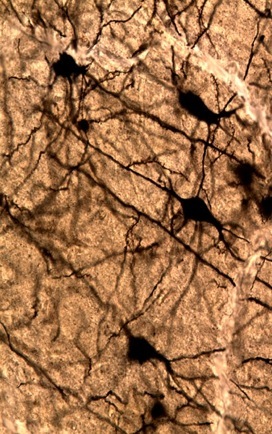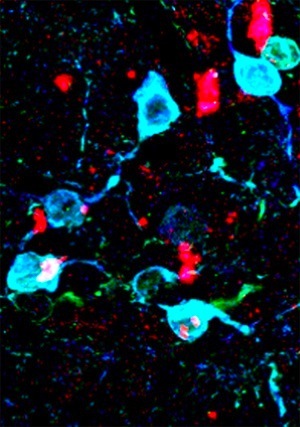
 Ruth G. Perez, Ph.D.
Ruth G. Perez, Ph.D.
Assistant Professor of Neurology
University of Pittsburgh School of Medicine
Ruth Perez received her B.S. and M.A. degrees from the University of Texas at El Paso and her Ph.D. from the University of Pittsburgh School of Medicine. After postdoctoral training at the Center for Neurologic Diseases at Brigham and Women’s Hospital of Harvard Medical School she joined the faculty of the Allegheny Singer Research Institute, Medical College of Pennsylvania Hahnemann and Allegheny University of the Health Sciences in Pittsburgh in 1997. She returned to the University of Pittsburgh in 1999 and in 2005 became Assistant Professor of Neurology with a secondary faculty appointment in the Department of Pharmacology. Her basic research has been funded by the Alzheimer’s Association, Scaife Family Foundation, Michael J Fox Foundation, Ethyl Vincent Charitable Trust, and by major funding from the National Institute of Neurological Disorders and Stroke of the National Institutes of Health.
Research
The Perez lab studies the normal function of proteins that have been implicated in neurological diseases, utilizing cellular and transgenic models manipulated by transfection or viral transduction. Key projects are related to Parkinson’s disease (PD), Dementia with Lewy Bodies (DLB), Alzheimer’s disease, and Diabetes. The lab’s PD and Diabetes work focuses on the functions of alpha-synuclein and 14-3-3, two chaperone-like proteins that often work in counterpoint to regulate key proteins with which they interact. With regard to PD, the Perez lab has shown that alpha-synuclein regulates the synthesis of dopamine, a neurotransmitter that contributes to olfaction, body movements, affect, and cognition; however, dopamine is toxic when dysregulated. New data from the lab demonstrate that alpha-synuclein also contributes to the release of insulin from pancreatic beta cells by interacting with and inhibiting the activity of the inwardly rectifying potassium channel, Kir6.2. The DLB studies focus on the impact of alpha-synuclein aggregation on changes in the activity of the phosphatase, PP2A, which modulates phosphorylation of key brain proteins. Those studies align closely with Alzheimer-related projects to investigate the normal function of the amyloid precursor protein (APP) in neuronal cells. Together these projects form a concerted effort to identify novel targets for improving neuronal function and the quality of life of patients with “synucleinopathies”.
Links:
Recent Publications:
- alpha-Synuclein Binds the KATP Channel at Insulin Secretory Granules and Inhibits Insulin Secretion. Geng X, Lou H, Wang J, Li L, Swanson AL, Sun M, Beers Stolz D, Watkins SK, Perez RG, Drain P. Am J Physiol Endocrinol Metab. 2010 Sep 21. [Epub ahead of print]
- Serine 129 phosphorylation reduces the ability of alpha-synuclein to regulate tyrosine hydroxylase and protein phosphatase 2A in vitro and in vivo. Lou H, Montoya SE, Alerte TN, Wang J, Wu J, Peng X, Hong CS, Friedrich EE, Mader SA, Pedersen CJ, Marcus BS, McCormack AL, Di Monte DA, Daubner SC, Perez RG. J Biol Chem. 2010 Jun 4; 285(23):17648-61.
- 14-3-3zeta contributes to tyrosine hydroxylase activity in MN9D cells: localization of dopamine regulatory proteins to mitochondria. Wang J, Lou H, Pedersen CJ, Smith AD, Perez RG. J Biol Chem. 2009 May 22; 284(21):14011-9.
- Alpha-synuclein aggregation alters tyrosine hydroxylase phosphorylation and immunoreactivity: lessons from viral transduction of knockout mice. Alerte TN, Akinfolarin AA, Friedrich EE, Mader SA, Hong CS, Perez RG. Neurosci Lett. 2008 Apr 11; 435(1):24-9.
- Phosphorylation of beta-amyloid precursor protein (APP) cytoplasmic tail facilitates amyloidogenic processing during apoptosis. Sodhi CP, Perez RG, Gottardi-Littell NR. Brain Res. 2008 Mar 10; 1198:204-12.
- Alpha-synuclein inhibits aromatic amino acid decarboxylase activity in dopaminergic cells. Tehranian R, Montoya SE, Van Laar AD, Hastings TG, Perez RG. J Neurochem. 2006 Nov; 99(4):1188-96.
- Alpha-synuclein activation of protein phosphatase 2A reduces tyrosine hydroxylase phosphorylation in dopaminergic cells. Peng X, Tehranian R, Dietrich P, Stefanis L, Perez RG. J Cell Sci. 2005 Aug 1; 118(Pt 15):3523-30.
- Could a loss of alpha-synuclein function put dopaminergic neurons at risk? Perez RG, Hastings TG. J Neurochem. 2004 Jun; 89(6):1318-24. Review.
Perez Lab Members:
Jie Chen, MS, Research Associate
Xiaomin Wang, MD, MS, Research Associate
Erin Stachowski, Rotating Graduate Student c
Kaitlin Farrell, Undergraduate Researcher
Kelly Singel, Undergraduate Researcher
.jpg)

